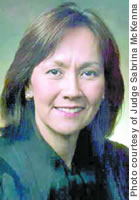Lingle’s Judges, Training Journalists

Wednesday - November 14, 2007
| Share
 Del.icio.us
Del.icio.us
|
What is it with Gov. Lingle and her appointments to the Intermediate Court of Appeals, the bench that gets most appellate cases before they move to the State Supreme Court?
First it was Randal Lee, a Circuit judge for only two years and no civil law background - he was a deputy city prosecutor. Now it’s Katherine Leonard, a civil lawyer who has never been a judge but would be asked to judge judges’ work.
You know what I’d like? A statute that says every Supreme Court and Intermediate Appeals Court nominee must have at least five years’ judicial experience, at least three of those at the Circuit level, and must be rated “highly qualified” by the State Bar Association. Must have criminal and civil experience.
We deserve that.
When Lingle nominated Lee, who failed confirmation, she picked him No. 1 from a Judicial Selection Commission list of six that included veteran Circuit Court Judge Sabrina McKenna, one of our finest and most qualified jurists, and the similarly qualified Circuit Court Judge Frances Wong. In January, she picked non-judge Mark Rechtenwald for Chief Intermediate Appeals Judge from the list that included McKenna.
Why should we settle for an ex-law clerk, lawyer-partner from the Carlsmith Ball firm?
Former TV anchor Tom Brokaw said it all for me in a Time magazine interview when asked for his advice to prospective journalists:
“Get a broad base of education. I’m not a big fan of journalism schools except those that are organized around a liberal arts education. Have an understanding of history, economics and political science - and biology, these days - and then learn to write.”
That was my talking point to would-be’s for many years, but they kept signing up for the UH J-school. Nothing against that program - it’s staffed by very competent people hoping to turn out very competent journalists.
But the craft of journalism is more an on-the-job-training event. Like learning to be a carpenter. You work with an experienced carpenter who shows you how to saw a board in half without that last cut tearing the wood.
What most of the people I interviewed did not have was a solid background in political history, world literature, science and anthropology. I don’t think you can be a good journalist without those tools.
I wanted someone who could be sent to the airport to interview Stephen Hawking about black holes or Gabriel Garcias Marquez about ghosts and perceptions.
I wanted someone who understood the latest happenings in biology, in Argentina, in voters’ political attitudes, and why Americans and Arabs or Asians don’t stand the same distances apart when having face-to-face conversations.
So, yes, give me the person with a solid liberal arts education. Then, while he’s still getting that, give him a smattering of the essential tools of print or broadcast journalism and let him intern to learn the rest.
And about Brokaw’s advice to learn to write. I’m not sure anybody can ever be taught to be a very good writer. I suspect some have the knack and some don’t. The “don’ts” never become very good writers. Just passable writers. But that’s OK. Look at newspapers and TV. They are heavily staffed by passable writers.
Maybe we’ll see what some of our editors and J-school professors have to say about this.
E-mail this story | Print this page | Comments (0) | Archive | RSS Comments (0) |
Most Recent Comment(s):













